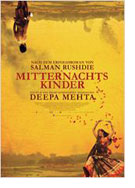

Opening 28 Mar 2013
Directed by:
Deepa Mehta
Writing credits:
Salman Rushdie
Principal actors:
Satya Bhabha, Shahana Goswami, Rajat Kapoor, Shabana Azmi, Ronit Roy
At midnight, August 15, 1947, India won independence from Great Britain. Babies born at the same time received special recognition from the government. One of these children, Saleem Sinai, tells his story over four generations from 1917 to 1977. He begins with his grandfather, Aadam Aziz, the one with the big nose, and grandmother Naseem who produces three daughters, including Amina, Saleem’s mother. Unbeknownst to the family, the midwife, in a surge of moral righteousness, exchanges babies, so that Saleem is actually a bastard child of poor parents with no genetic connection to anyone in the rich Muslim family where he grows up. His counterpart, Shiva, grows up as the illegitimate son of a British counsel and Vanita, a poor Hindu, who was married to Wee Willie Winkie, a travelling entertainer. Vanita dies in childbirth and Shiva, cheated out of his rich inheritance, quickly rises in politics to make a name for himself. Saleem’s secret is revealed when, due to an accident, his blood type is tested. His “father” can no longer stand his presence, accuses his wife of infidelity and sends the boy to his rich “aunt” Emerald and her husband General Zulifikar in Pakistan. Later, he returns to India and poverty. He writes his story, which, of course, reflects the same coming-of-age events that befall India and Pakistan – after all they were all born at the exact same minute. All of these children have the ability to read the thoughts of other people; they meet in spirit and compare experiences.
Based on the 1981 book of the same title by Salman Rushdie which won the Booker Prize, director Deepa Mehta invited Rushdie to produce a script now 30 years later. Rushdie cooperated, although it meant cutting book scenes to movie length (148 minutes are still quite long). Anyone who has read the intricate book will be happy with the straight-forwardness of the film, with no loss of fascinating characters and plot, including references to Hindu, Christian and Muslim religions and customs as well as stinging remarks against the Prime Minister Indira Ghandi. This is a film about India, but it is not Bollywood. The costumes are sumptuous, e.g., an extravagant wedding, and the sets are amazingly real, although it was filmed in Toronto and Sri Lanka. The Iranian ambassador in Sri Lanka protested the making of a film based on a Rushdie book; they were forced to stop, wait, worry, and finally, after a great loss of time and money, could continue, thanks to intervention from government officials. From that point on, they filmed “under cover,” so to speak, using false names for themselves and their film title.
I enjoyed the many animals, green chutney, glass kisserei, the pater noster, and naturally, the actors (127 speaking roles), scenery, and music (Nitin Sawhney). Many quotes are food for thought long after the film is over, such as “The most important events in our lives occur in our absence.” (Becky Tan)